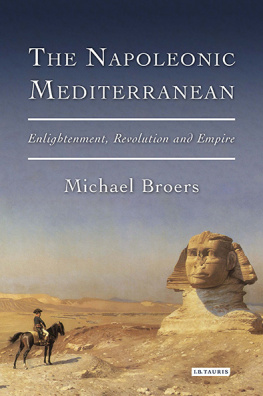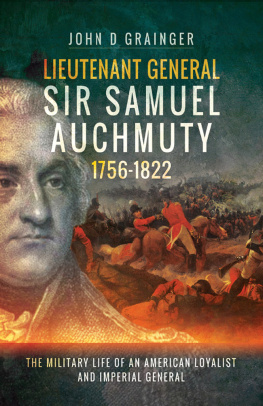Pagebreaks of the print version
EGYPT 1801
EGYPT 1801
THE END OF NAPOLEONS EASTERN EMPIRE
STUART REID
EGYPT 1801
The End of Napoleons Eastern Empire
This edition published in 2021 by
Frontline Books,
An imprint of
Pen & Sword Books Ltd,
47 Church Street, Barnsley, S. Yorkshire, S70 2AS,
This book is based on file reference CAB 44/324 , which is held at The National Archives, Kew, and is licensed under the Open Government Licence v3.0.
Copyright Stuart Reid 2021
Text alterations and additions Frontline Books
The right of Stuart Reid to be identified as author of this work has been asserted by him in accordance with the Copyright, Designs and Patents Act 1988.
ISBN: 978 1 52675 846 0
ePUB ISBN: 978 1 52675 847 7
Mobi ISBN: 978 1 52675 848 4
All rights reserved. No part of this publication may be reproduced, stored in or introduced into a retrieval system, or transmitted, in any form, or by any means (electronic, mechanical, photocopying, recording or otherwise) without the prior written permission of the publisher. Any person who does any unauthorized act in relation to this publication may be liable to criminal prosecution and civil claims for damages.
CIP data records for this title are available from the British Library
Pen & Sword Books Ltd incorporates the imprints of Air World Books, Pen &Sword Archaeology, Atlas, Aviation, Battleground, Discovery, Family History, History, Maritime, Military, Naval, Politics, Social History, Transport, True Crime, Claymore Press, Frontline Books, Praetorian Press, Seaforth Publishing and White Owl
For a complete list of Pen & Sword titles please contact:
PEN & SWORD BOOKS LTD
47 Church Street, Barnsley, South Yorkshire, S70 2AS, UK.
E-mail:
Website: www.pen-and-sword.co.uk
Or
PEN AND SWORD BOOKS,
1950 Lawrence Road, Havertown, PA 19083, USA
E-mail:
Website: www.penandswordbooks.com
Introduction
On 8 March 1801, just a bare matter of weeks into the new century, the British Army won an unlikely victory over what until then was regarded as the foremost army in Europe; through an opposed beach landing in far off Egypt no less.
Within days it then proceeded to demonstrate that this first triumph had been no fluke by winning two more major battles in the open field, each just a week apart. Then, in a strange campaign waged over the space of the next seven months, it surmounted all difficulties to march up the Nile, capture the fabled city of Cairo and then, amidst the ruins of antiquity, compel a French army, superior to it in numbers, to capitulate and evacuate Napoleon Bonapartes eastern empire. This sustained series of victories in such bizarre circumstances which at one point included the desperate defence of a two-millennia-old Roman fortress was all the more dramatic because except in far-off India, the preceding decade had seen Britain and its armies reach the nadir of its fortunes as a military power. It had been defeated in Europe and unsuccessful in the Caribbean at an awful cost and yet now not only came a stunning series of battles in Egypt but the confidence and expertise that it gained there then in turn ushered in the yet more famous campaigns in the Spanish Peninsula and the crowning glory of Waterloo.
And yet this transformative experience was supposedly the work of just two men, one old and effectively blind, and the other a painfully inexperienced nonentity. Neither of them, if judged dispassionately, should have been allowed anywhere near the command of an army.
Explaining how this remarkable victory came about therefore goes far beyond the chessboard moves on the battlefield, for in truth, although the French made a succession of bad decisions, there was precious little in the way of fertile genius displayed by the British high command either. Instead, the victory and it was a very real one was brought about, just as it would be at Inkerman fifty years later, by the brigadiers, such as John Moore and John Stuart, by the colonels and the captains and above all by the sheer hard fighting and determination of the ordinary British soldiers amidst the most arduous conditions.
Napoleonic-era campaigns are often seen in terms of the sweeping but disciplined manoeuvres laid down in the drill books of the day, resulting in dramatic charges or dogged retreats, and above all, movement. Yet the Egypt business was different, and not just due to its exotic setting. The operations against the French-held city of Alexandria time and again seem to provide a foretaste of the First World War, with heavy casualties expended to achieve advances measured in just yards before victory suddenly came, just as it would do in 1918 with a catastrophic failure in enemy morale.

















